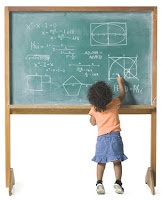In her article, Differentiated Instruction for Young GiftedChildren: How Parents Can Help, Joan Smutny does an excellent job of explaining strategies that can be
used in the classroom to address the needs of young gifted children, including
- Compacting—Children skip content that they already know and move to more advanced work.
- Learning Stations—Areas of the classroom where students can work on different tasks within a unit. Each station may represent a higher level of complexity than the one before it. Students move freely from one task to the next.
- Tiered Activities—A classroom of children may focus on the same, broad learning goal, but at different levels of depth and complexity.
- Clustering—Students who are significantly ahead are grouped and provided with more advanced content.
The best parts of Smutny’s article, though, are the many
quotes and stories about children she uses to illustrate her points. She not
only explains the strategies that might be used in the classroom to
differentiate instruction, but also shows parents how they can enhance their children’s
learning at home and also support and get involved with student learning at
school.
From this article, both parents and teachers will get ideas
about ways they can form better partnerships to enhance the learning of young
gifted students.
Smutny has made young gifted children one of her
specialties. If you like her article mentioned here, you will probably also
enjoy some of the many books that she has written on the subject. You will find
these by going to web sites such as Amazon and typing in her name or doing a general Internet
search using her name.



